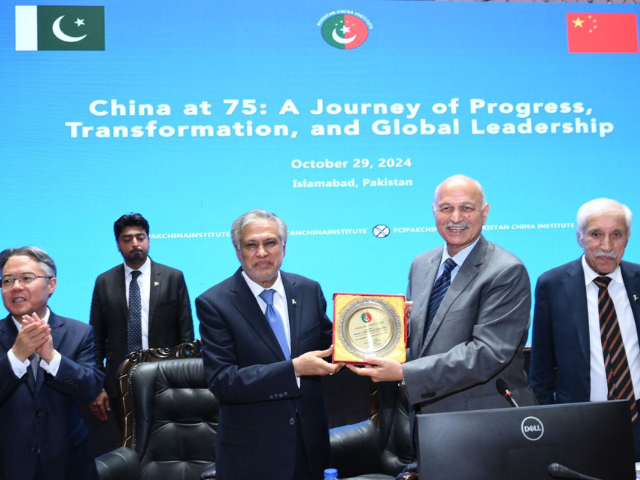The Pakistan-China Institute, chaired by Senator Mushahid Hussain Saeed, on Monday held an international conference titled ‘China at 75: A Journey of Progress, Transformation and Global Leadership’. The event celebrated the 75th anniversary of the founding of the People’s Republic of China and explored its impact on global geopolitics and economic development.
The event, where Deputy Prime Minister Ishaq Dar was the chief guest, was attended by prominent figures such as Jiang Zaidong, Chinese Ambassador to Pakistan, eminent economist Dr. Ishrat Hussain, and Federal Maritime Minister Qaiser Ahmed Sheikh. We met together.
Their collective insights aimed to shed light on China’s transformation journey over the decades and its pivotal role in shaping international relations.
1730286371-0/Copy-of-Untitled-(4)1730286371-0.png)
Senator Mushahid Hussein opened the meeting by emphasizing that China’s peaceful rise is an important story on the world stage.
He articulated the strategic partnership between Pakistan and China and outlined the evolution of China’s journey in three distinct stages: revolution, reform and peaceful rise. He pointed out that Pakistan remains firmly aligned with China as it navigates the complexities of the Asian century.
Ambassador Jiang expressed gratitude for the participation of senior Pakistani leaders and highlighted the Belt and Road Initiative (BRI) as a hallmark of China’s efforts to promote shared prosperity. He expressed concern about the safety of Chinese projects in Pakistan, especially in light of recent attacks on Chinese people and investments, and called for stronger measures to ensure the security of these operations.
In his keynote speech, Democratic Prime Minister Ishaq Dar praised China’s rapid transformation, particularly its progress in climate action, digital innovation, and economic development. He reaffirmed Pakistan’s unwavering support for the “One China” policy and emphasized its importance in maintaining regional stability.
Mr. Dar further emphasized the importance of the China-Pakistan Economic Corridor (CPEC), rejecting the perception that it is a debt trap and reinforcing its role as a catalyst for Pakistan’s socio-economic growth.
Dr. Ishrat Hussain provided an in-depth analysis of China’s transition from a command-driven economy to a market-oriented system and explained how this transition brought China into the spotlight of the global economy .
He noted that China’s one-party governance model facilitates rapid decision-making and policy implementation, making it possible to effectively tackle challenges and achieve impressive economic growth rates.
The conference also featured contributions from other eminent speakers, including Qaiser Ahmed Sheikh, who reiterated the long-standing friendship between Pakistan and China.
Mumtaz Zahra Baloch, Director-General of the Ministry of Foreign Affairs, emphasized the importance of South-South cooperation in addressing common challenges and promoting mutual development.
Throughout the event, speakers acknowledged China’s leadership role in promoting economic partnership, global stability, and addressing pressing issues such as climate change and poverty alleviation. They discussed how initiatives like Belt and Road have transformed infrastructure and connectivity, benefiting many developing countries, including Pakistan.
At the end of the meeting, the participants expressed optimism about the future of Pakistan-China relations and advocated deepening cooperation in various areas such as trade, technology and education. The event highlighted the two countries’ common vision of strengthening relations and striving towards a prosperous future.

